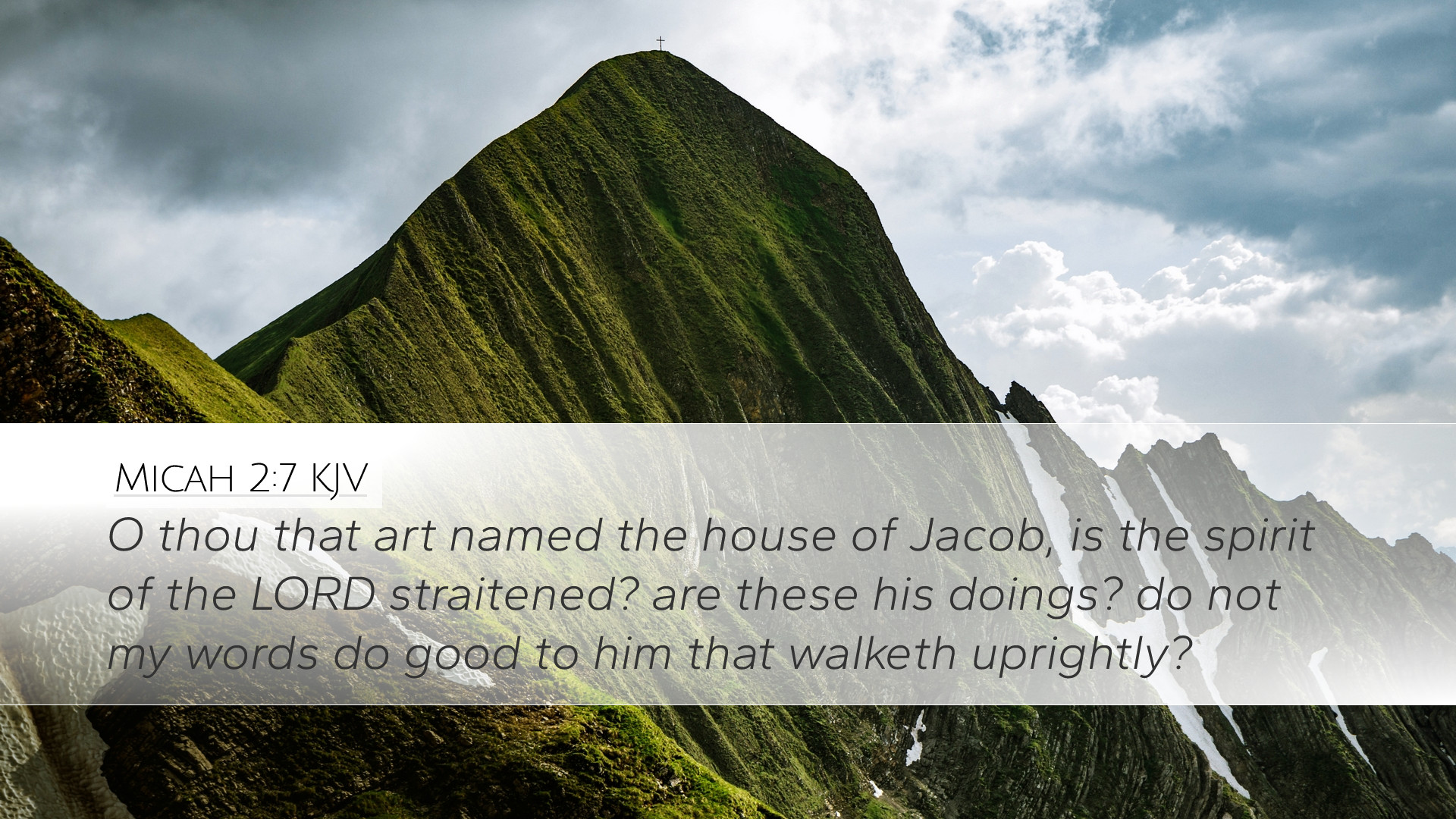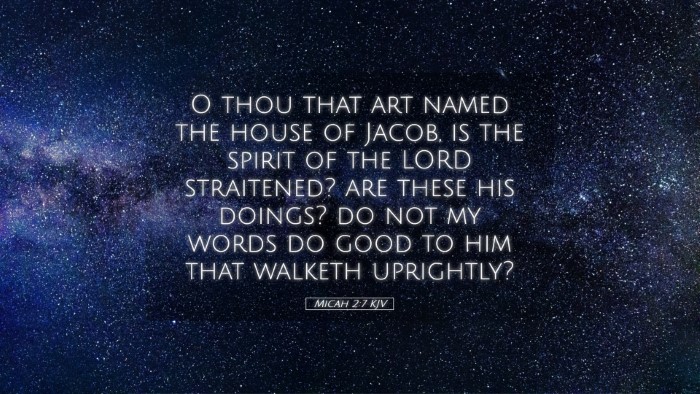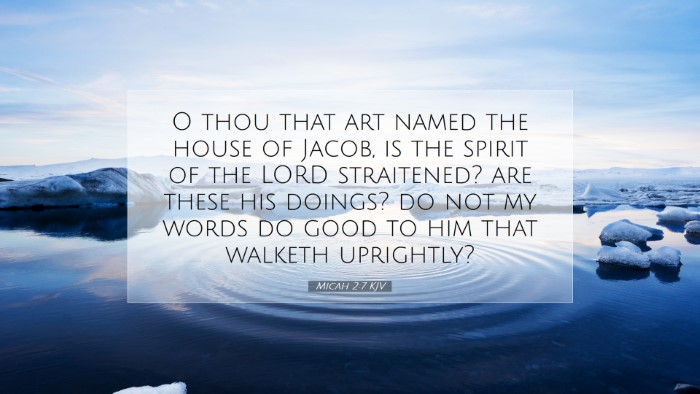Old Testament
Genesis Exodus Leviticus Numbers Deuteronomy Joshua Judges Ruth 1 Samuel 2 Samuel 1 Kings 2 Kings 1 Chronicles 2 Chronicles Ezra Nehemiah Esther Job Psalms Proverbs Ecclesiastes Song of Solomon Isaiah Jeremiah Lamentations Ezekiel Daniel Hosea Joel Amos Obadiah Jonah Micah Nahum Habakkuk Zephaniah Haggai Zechariah MalachiMicah 2:7
Micah 2:7 KJV
O thou that art named the house of Jacob, is the spirit of the LORD straitened? are these his doings? do not my words do good to him that walketh uprightly?
Micah 2:7 Bible Commentary
Bible Commentary on Micah 2:7
Verse Context: Micah 2:7 reads: "O thou that art named the house of Jacob, is the Spirit of the LORD straitened? are these his doings? do not my words do good to him that walketh uprightly?" This verse occurs within the broader context of Micah's prophetic calls for justice and righteousness, emphasizing the moral demands of God on His people.
Overview
This verse serves as a poignant reminder of the nature of God’s character and the expectations He has for His followers. In interpreting this verse, we draw insights from classic commentaries to unveil its theological implications and practical applications.
Historical Context
The historical setting of Micah’s prophecy corresponds to a time of moral decay among the people of Israel, which raises significant questions about divine justice and human conduct. Micah, a contemporary of Isaiah, prophesied during the 8th century B.C. when both the northern kingdom of Israel and the southern kingdom of Judah were experiencing significant social injustices and idolatry.
Theological Insights
Divine Justice and Human Conduct: Micah’s rhetorical question highlights that God’s omnipotence and goodness are not at odds with His expectations of man. Rather, it urges the people of Jacob to examine their own actions and attitudes, recognizing that God’s Spirit is not limited or constrained. Instead, it is the hearts of the people that have grown distant from His ways.
- Matthew Henry: He emphasizes the nature of God's Spirit, asserting that it is ever ready to act favorably towards those who seek Him earnestly and walk uprightly. His commentary posits that the fault lies not with God's readiness to bless but with human responses to divine truth.
- Albert Barnes: Barnes illustrates the idea that the "house of Jacob" represents the covenant community, called to reflect God’s righteousness through their lives. He notes that the challenge remains in their response to God’s guidance as communicated through His prophets.
- Adam Clarke: Clarke interprets the phrase "is the Spirit of the LORD straitened?" as an inquiry into whether God’s power is limited in doing good, emphasizing that God's promises are always accessible for those who act in righteousness and integrity.
Calls to Reflection
The exhortation in Micah 2:7 encourages believers to reflect on their standing before God. Are we living to uphold righteousness in our communities? The text compels an introspective look, avoiding complacency in faith practice.
- Challenge of Complacency: Communities of faith must evaluate if they are merely holding the name of Jacob without fulfilling the implications of that identity, which includes justice, mercy, and humility before God.
- Affirmation of God’s Justice: There is an assurance that God’s words bring life and good to those who earnestly follow Him, reinforcing the hope that divine justice will ultimately prevail.
- Active Engagement: Engaging with the Spirit of God means actively participating in His work and embodying His righteousness in our interactions with others, demonstrating faith through action.
Practical Application for the Believer
As followers of Christ today, Micah’s message remains pertinent. Verse 7 calls for action, compelling believers to live out principles that can transform individuals and communities alike.
- Pray for Guidance: Seeking the Spirit’s guidance in everyday decisions aligns us with God’s purposes and reinforces our commitment to justice and righteousness.
- Community Engagement: Believers are encouraged to participate in their communities actively, ensuring that they embody the justice of God. This could mean working towards social justice and helping those marginalized by society.
- Spread the Good News: The understanding that God desires to bless and do good is foundational for sharing the Gospel — that His Spirit is available to all who seek Him with sincerity.
Conclusion
Micah 2:7 serves as a critical reminder of the nature of God’s relationship with humanity, emphasizing that while God is unchanging and always ready to pour out His goodness and favor, it is humanity's responsibility to align with His ways. This verse beckons us to listen, reflect, and enact the righteousness that God desires from His people, compelling us toward deeper engagement with His Spirit and His word.


